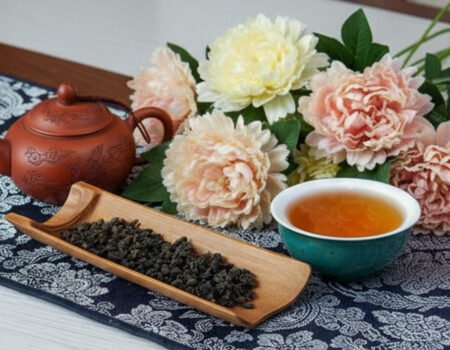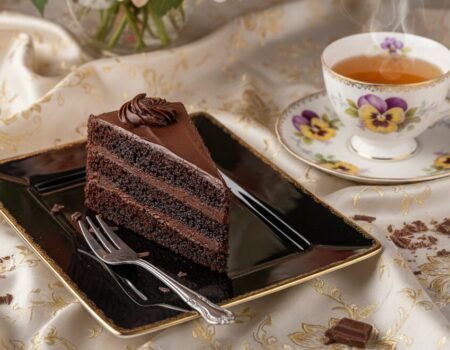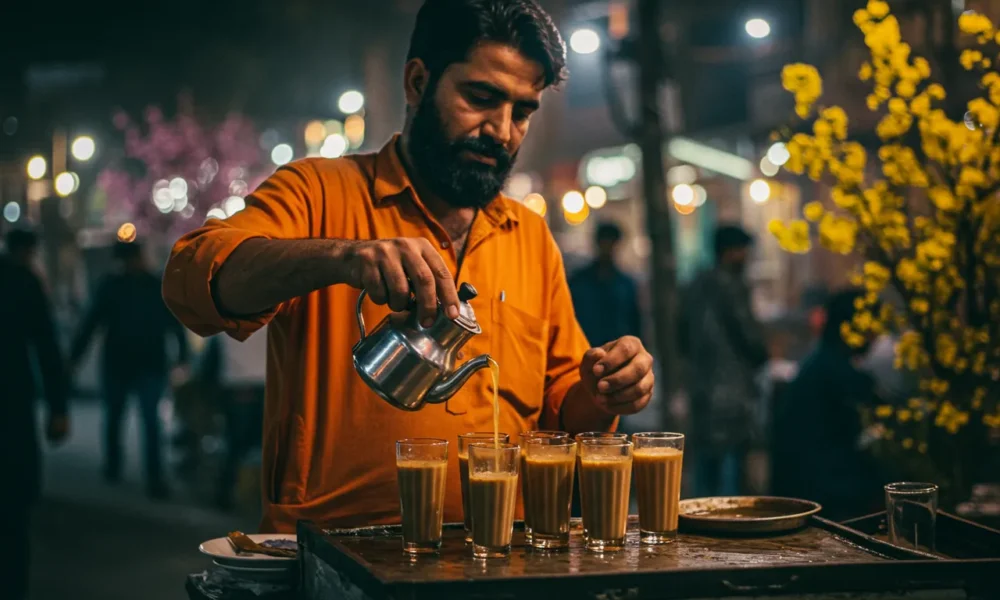
How to Make Tea Like Chaiwala: Best Karak Chai Recipe with Masala Chai Twist
Index
The secret of making karak chai lies in both the ingredients and the brewing method that most home recipes miss. This strong, creamy tea gets its distinct taste from simmering black tea leaves with aromatic spices like cardamom, cinnamon, and ginger.
In this guide, you’ll learn exactly how to make tea like a chaiwala (Indian tea vendor) with our authentic indian recipe that includes a masala chai twist for extra flavor. The results will amaze your taste buds.
Key Takeaways
- Use loose black tea leaves like Assam or Ceylon for the best karak chai flavor, as they provide deeper taste than tea bags.
- Simmer your tea with cracked cardamom pods, cinnamon, cloves, and fresh ginger for 5-7 minutes before adding milk.
- Evaporated milk creates the most authentic karak chai, though whole milk or plant-based alternatives work too.
- The perfect chai requires 3-5 minutes of boiling after adding milk until it reaches a golden amber color.
- Add chai masala early in the brewing process to release essential oils from the spices for a more balanced flavor.
What is Karak Chai?
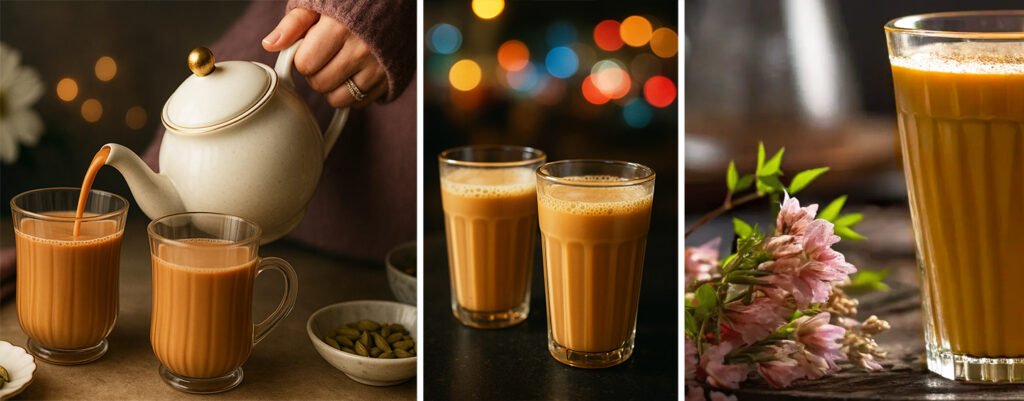
Karak chai stands as a robust, milky tea that first gained popularity in the Gulf region but has roots in Indian tea traditions. The name itself tells you what to expect – “karak” means “strong” in Hindi, perfectly describing this bold beverage.
This special tea blends black tea leaves with milk and spices like cardamom and ginger to create its signature taste. Unlike regular masala chai, karak chai offers a sweeter, creamier experience thanks to the use of condensed or evaporated milk that gives it a rich texture.
Tea lovers across the world now enjoy this flavorful drink that balances the intensity of black tea with the smoothness of milk. The brewing process typically involves simmering the ingredients together until they reach the perfect golden color and depth of flavor.
The key ingredients for making authentic karak chai include specific types of tea leaves and a careful selection of spices that we’ll explore next.
Key Ingredients for Karak Chai
The perfect karak chai starts with fresh, high-quality ingredients that blend together to create that signature rich flavor. You’ll need strong black tea leaves, aromatic spices like cardamom and cinnamon, full-fat milk, and the right amount of sugar to balance the boldness.
Tea leaves
Loose black tea forms the backbone of any authentic karak chai recipe. You’ll need 4-6 teaspoons of loose black tea leaves for a robust brew that stands up to milk and spices. Strong varieties like Assam, Ceylon, or Kenyan black teas work best because they provide the deep, malty flavor that defines proper karak chai.
These leaves contain natural tannins that create that distinctive amber color and bold taste that chai lovers crave. Tea bags can substitute in a pinch, but loose leaves allow better flavor extraction during the simmering process.
The quality of your tea leaves directly impacts your final cup, so invest in fresh, aromatic leaves for the most authentic results.
Spices (cardamom, cinnamon, cloves, ginger)
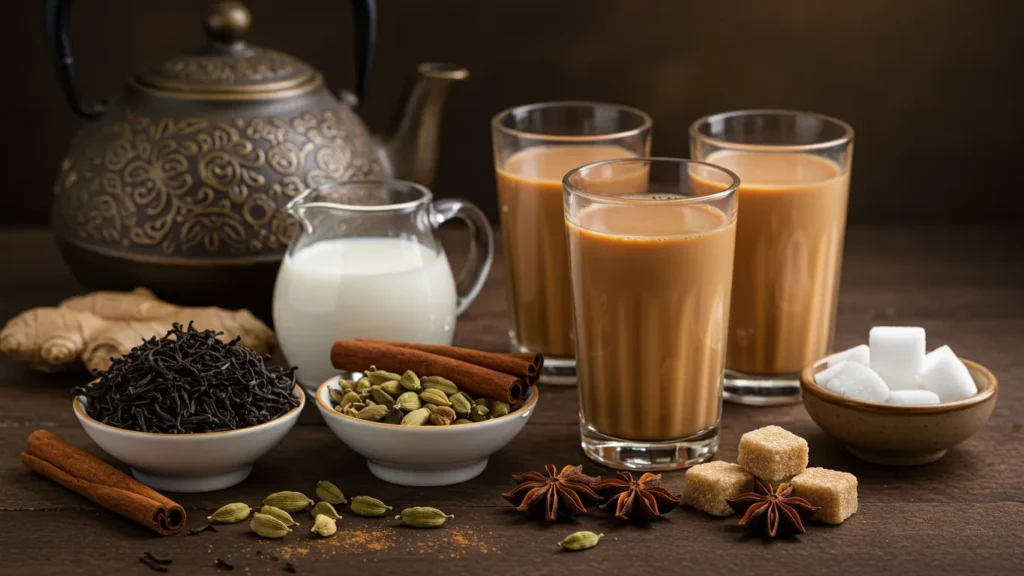
While quality tea leaves form the base of any good chai, the spices transform it into something magical. The perfect karak chai depends on a specific blend of aromatic spices. Green cardamom pods serve as the star ingredient—use 8 slightly cracked pods to release their full flavor.
Add 4 cloves for a warm, slightly sweet punch that balances the stronger notes. A small cinnamon stick brings subtle sweetness and complexity to your chai masala mix.
Fresh ginger plays a crucial role in authentic chai. Slice a 1-inch piece thinly to extract maximum flavor during simmering. These spices don’t just taste good—they create the distinctive aroma that fills your kitchen when making proper Indian chai.
Each spice contributes unique notes that blend together during the brewing process. Many chai lovers adjust these ratios based on personal preference, but this classic combination delivers that street-style flavor that makes karak chai so special.
Milk or milk alternatives
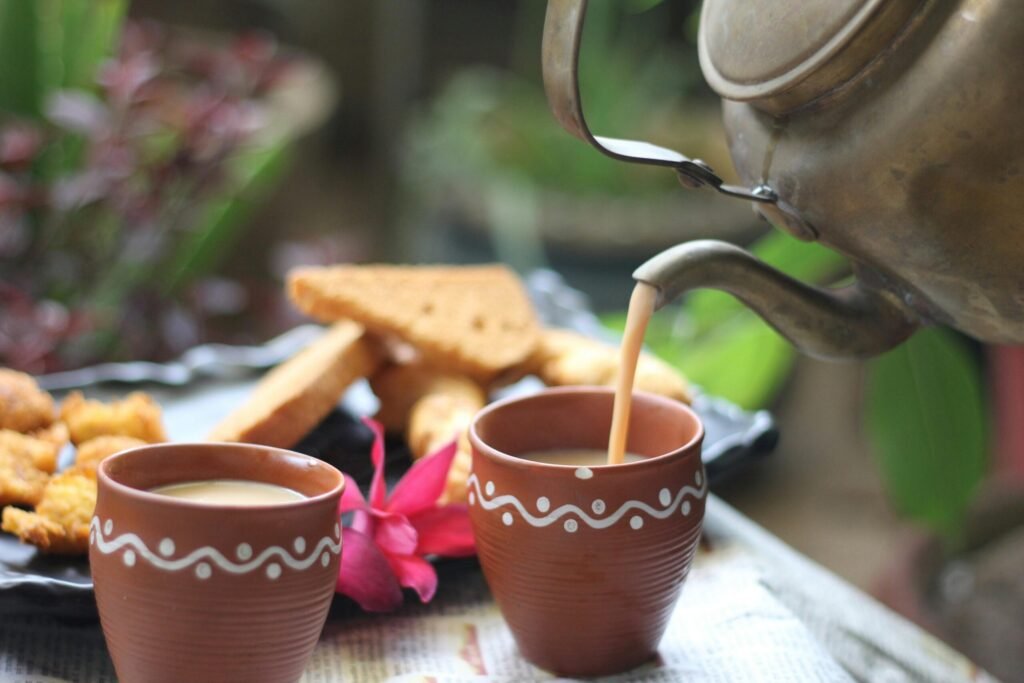
Evaporated milk forms the backbone of authentic karak chai, with 400 ml creating that perfect creamy texture and rich taste. Full-fat milk delivers the most traditional flavor profile, while semi-skimmed offers a lighter option without sacrificing too much richness.
For those avoiding dairy, plant-based options like oat, almond, or coconut milk work as excellent substitutes in your chai recipe. Each alternative brings its unique flavor notes – coconut adds tropical sweetness, oat provides creaminess, and almond contributes a nutty undertone.
The milk you select greatly impacts both the texture and taste of your final brew. Most chai experts suggest adding milk after the tea leaves and spices have fully released their flavors.
This sequence allows the tea to develop its depth before the milk smooths out the intensity. Next, we’ll explore the traditional methods that transform these simple ingredients into the magical street-style chai that captivates tea lovers worldwide.
Sugar or sweetener of choice
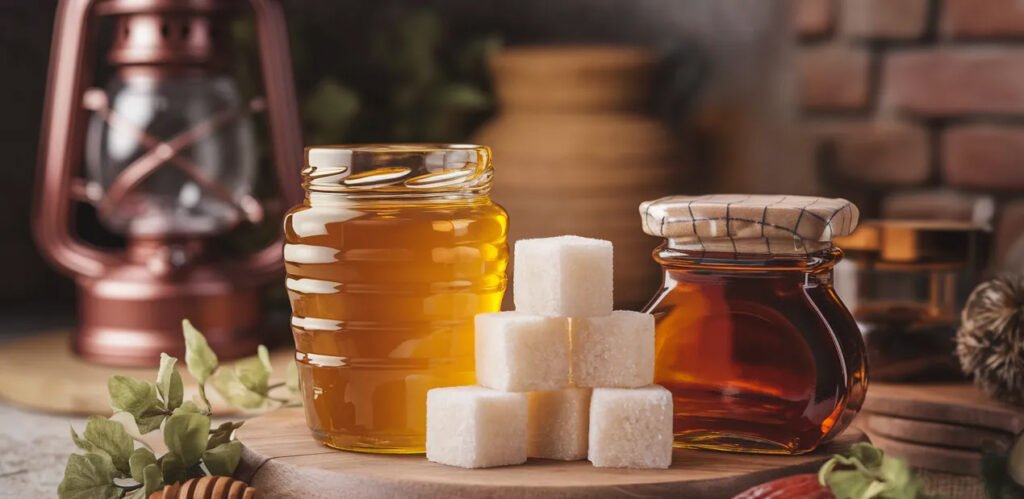
Sugar plays a crucial role in creating the perfect karak chai. Most authentic recipes call for 4-6 teaspoons of sugar, which you can adjust based on your preference. The sweetness balances the robust spices and creates that signature chai flavor profile.
Many chai lovers add the sugar during the initial brewing process rather than at the end, allowing it to fully dissolve and blend with the other ingredients.
You might experiment with alternatives like honey, maple syrup, or even date syrup for different flavor notes. Each sweetener brings its unique character to your chai experience. The right amount of sweetness transforms your spiced tea from good to exceptional, creating that authentic street-style taste that makes karak chai so beloved.
Next, we’ll explore the traditional methods to achieve that perfect cup of chai that rivals any street vendor’s creation.
Traditional Methods to Make Authentic Street-Style Chai
Street vendors across South Asia have perfected chai-making through generations of practice. Their methods involve slow cooking the tea with spices in a large pot, creating deep flavors you can’t get from quick brewing.
Simmering tea leaves and spices
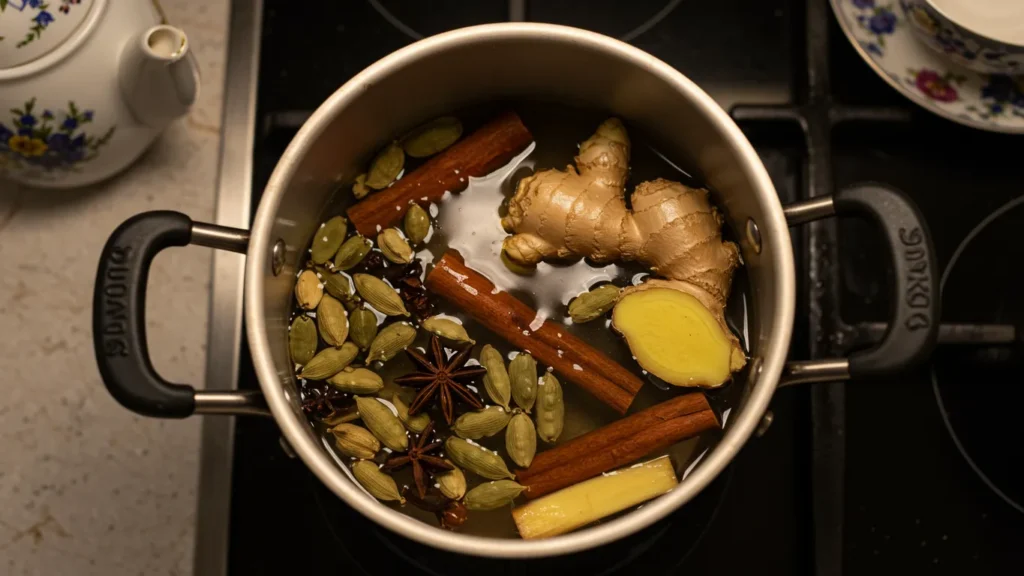
The magic of karak chai starts with proper simmering. Pour 1 liter of water into a deep saucepan and add your tea leaves, cardamom pods, cloves, cinnamon sticks, and fresh ginger. Bring this mixture to a rolling boil over high heat.
Next, reduce the heat to medium-low and let the blend simmer for 5-7 minutes. This crucial step allows the water to extract rich flavors from each ingredient. The liquid will darken gradually as the tea releases its tannins and the spices infuse their aromatic compounds.
During this simmering phase, you’ll notice the water taking on a golden-brown color while your kitchen fills with exotic scents. The longer you simmer, the stronger your chai base becomes.
For a more robust flavor, gently stir the mixture once or twice with a wooden spoon to help the ingredients release their essences. The tea leaves will expand while the spices soften, creating a fragrant foundation for your karak chai.
This patient process cannot be rushed if you want authentic street-style results.
Adding milk and boiling to perfection
Pour 400 ml of evaporated milk into your tea mixture and raise the heat to medium. This step transforms your chai from basic to extraordinary. The milk adds richness while cutting through the strong tea flavor.
You must bring this mixture to a low boil for 3-5 minutes until it reaches that perfect golden color. Many chai experts use a ladle to lift and pour the tea back into the pot. This action aerates the mixture and creates that frothy texture found in authentic street-style karak chai.
Milk choice matters greatly in your final cup. While evaporated milk gives the most authentic taste, you can substitute whole milk, half-and-half, or even non-dairy options. The key lies in the slow boiling process that allows the tea to thicken and develop its signature flavor profile.
Next, we’ll explore how to add a special masala chai twist to elevate your karak chai even further.
Achieving the golden color and rich flavor

The perfect milk-to-tea ratio transforms your chai from basic to extraordinary. After milk joins the mixture, the magic happens in the next 3-5 minutes of boiling. The tea leaves release their tannins while sugar caramelizes slightly, creating that signature golden amber color true chai lovers seek.
This critical step builds the rich flavor profile that makes karak chai special.
You’ll notice the tea thickens as it simmers, with tiny bubbles forming around the edges of your pot. The spices infuse completely during this phase, balancing warmth without overwhelming spiciness.
Many chai experts use a ladle to lift and pour the mixture back into the pot several times, which adds air and enhances both color and taste. This technique helps achieve that smooth, velvety texture that makes each sip of karak chai so satisfying.
Homestia Fine Mesh Strainer Set
Catches CTC granules and whole spices on the pour—at a friendly price point.
Straining chai through a fine mesh catches both the CTC tea granules and whole spices like cardamom pods and cinnamon sticks. At 3.3 inches, this fits neatly over chai cups for that satisfying pour—eight reviewers confirm it catches tea leaves and fine particles effectively.
⚠️ Skip this if you need something for heavy daily use over many months—consider it a functional budget option rather than a forever tool. For occasional weekend chai sessions, it performs well.
How to Add a Masala Chai Twist
Transform your regular karak chai into a flavor explosion with a masala chai twist. You can mix in a special blend of ground spices like cardamom, cinnamon, cloves, and ginger to create a richer taste profile.
Using chai masala for enhanced flavor
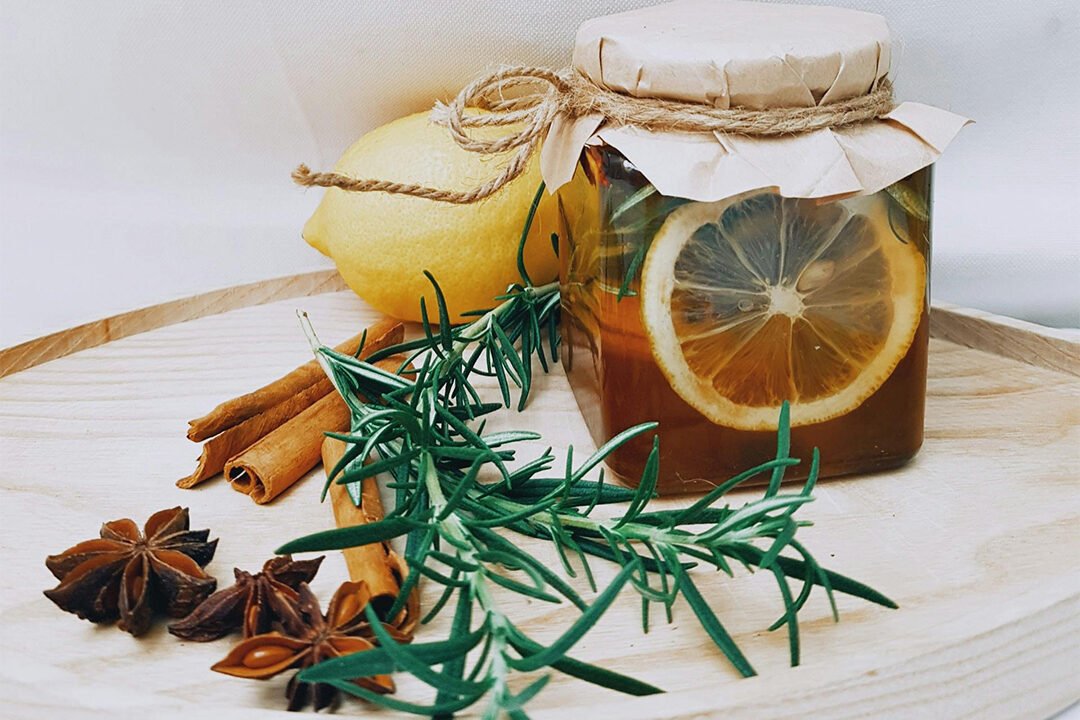
Chai masala transforms ordinary tea into a rich sensory experience with its blend of fragrant Indian spices. This aromatic mixture typically contains green cardamom, cloves, cinnamon, ginger, fennel seeds, and black peppercorns – each adding depth to your karak chai.
You can buy pre-made chai masala at most grocery stores or create your own by grinding these spices together in specific ratios that match your taste preferences.
To use chai masala effectively, add a small pinch (about 1/4 teaspoon) directly to your tea as it simmers with water. The heat releases essential oils from the spices, creating that distinct chai flavor that makes your cup special.
Many tea lovers find that adding the masala early in the brewing process helps the spices fully infuse before milk is added. This method produces a more robust cup with balanced flavors where no single spice overpowers the others. For a pre-blended option that leads with traditional ginger, cardamom, and black pepper rather than cinnamon-heavy Western profiles, try the Spicewalla Masala Chai Spice.
Experimenting with additional spices
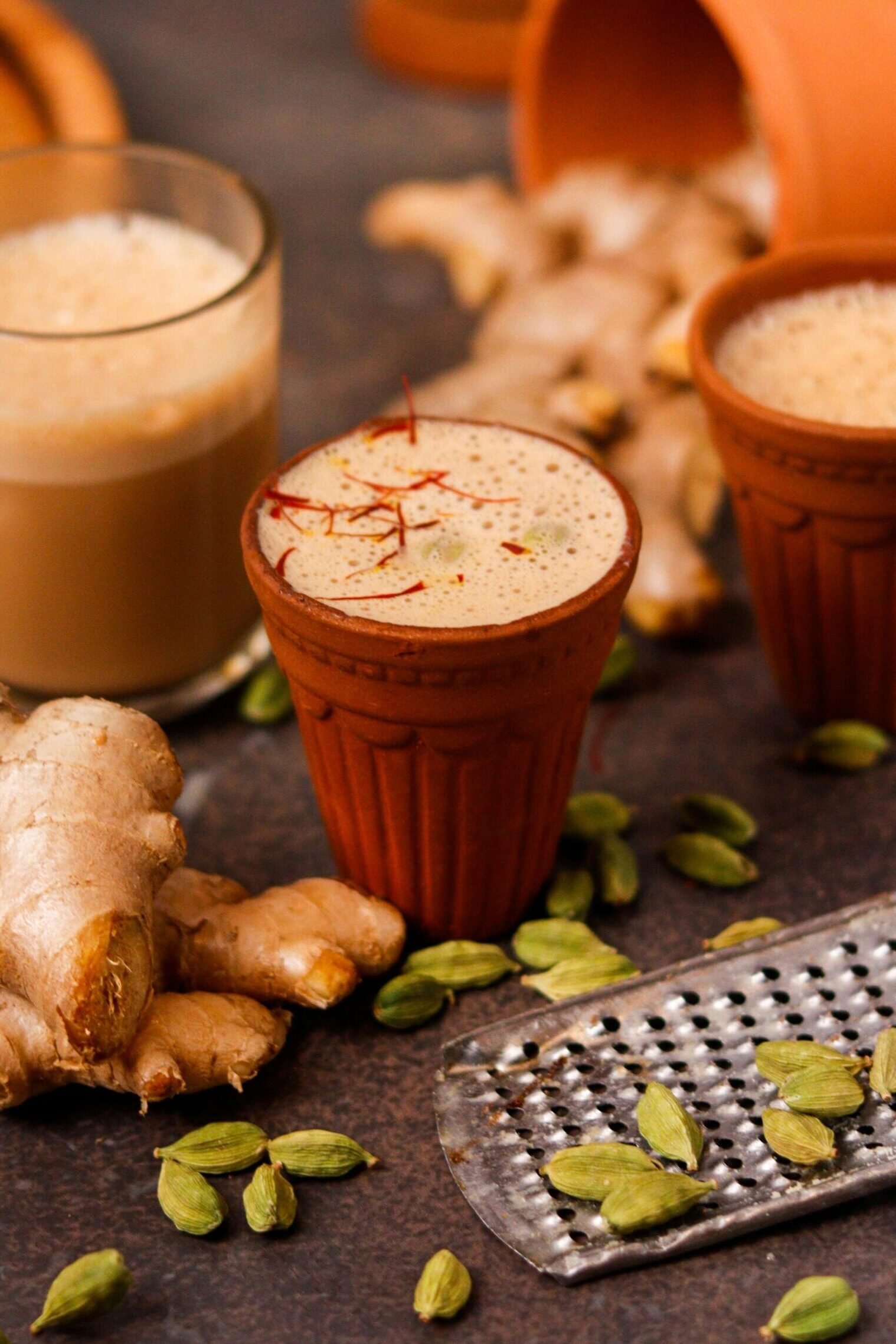
Spice exploration takes your karak chai to new heights with additions like black pepper and nutmeg. Black pepper adds a subtle heat that works well with the traditional cardamom and cinnamon, while creating depth in your cup.
Nutmeg brings a warm, slightly sweet note that pairs perfectly with milk tea and enhances the overall flavor profile.
Try adding a pinch of saffron to your chai for a luxurious golden color and distinct taste. Mint leaves or holy basil make refreshing herbal additions that complement the rich tea base.
You might also enjoy sliced fresh ginger instead of powder for a more intense zing. Each spice brings unique health benefits along with flavor, so adjust to taste as you perfect your personal masala chai blend.
Conclusion
Making karak chai at home brings the magic of street-side tea stalls right to your kitchen. The rich blend of black tea leaves, warm spices, and creamy milk creates a drink that warms both body and soul.
Adding a masala chai twist with extra ginger, cloves, or star anise takes your brew to new heights of flavor. You can adjust sweetness and milk levels to match your taste while still keeping the authentic chai experience intact.
Now grab your favorite mug, brew a batch of this aromatic karak chai, and savor each sip of this beloved drink that connects tea lovers across the world.
FAQs
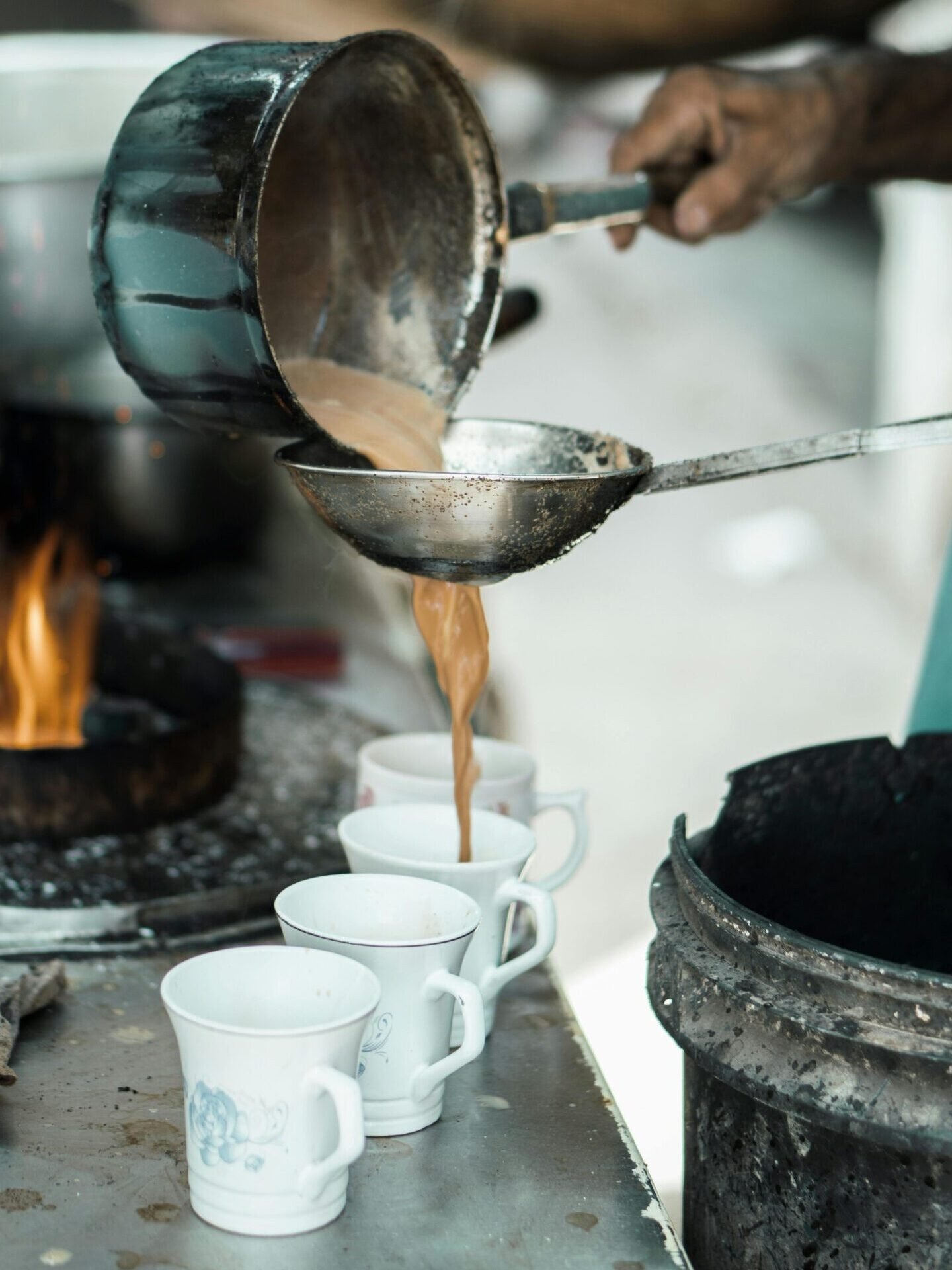
1. What is Karak Chai and how is it different from regular tea?
Karak chai is a strong Pakistani chai made with black tea, milk, sugar, and spices. Unlike regular tea, it has a bold flavor from longer brewing time and the addition of cardamom, ginger powder, and sometimes other masala spices.
2. What ingredients do I need to make authentic Chaiiwala Karak Chai at home?
You’ll need 1 cup water, 1 cup milk, tea leaves, sugar to taste, and cardamom. For a masala chai twist, add ginger powder and other spices like cinnamon or cloves.
3. What’s the basic process to make Karak Chai?
First, bring 1 cup water to a boil in a pot. Add tea leaves and let it simmer for 2-3 minutes. Then add the milk, increase the heat, and bring the mixture to a boil again. Add sugar to taste and strain into a teapot or cups.
4. Can I use evaporated milk instead of regular milk for Karak Chai?
Yes! Many chaiwalas use evaporated milk to create a richer flavor. Add the evaporated milk after the water and tea have simmered, then bring it to a boil while stirring with a ladle.
5. How should I serve Karak Chai for the best experience?
Serve karak chai hot in small cups, just like they do in Pakistani restaurants and coffeehouses. Pair it with cookies, cake, or biscuits for a complete tea experience. This quick and easy recipe makes a perfect afternoon treat.
6. What’s the secret to getting that authentic chai flavor?
The secret lies in allowing the flavors to develop by letting the tea simmer properly. Some chaiwalas also caramelize the sugar slightly before adding other ingredients. Using a ladle to repeatedly lift and pour the chai back into the pot while it cooks also enhances the flavor.
References
- https://monkschai.com/en-us/blogs/news/what-is-karak-chai-all-you-need-to-know
- https://foodess.com/karak-chai/ (2024-03-16)
- https://www.munatycooking.com/indian-strong-tea-karak-chai/ (2024-04-28)
- https://everylittlecrumb.com/karak-chai/ (2021-11-25)
- https://www.teaforturmeric.com/authentic-pakistani-chai/ (2025-02-12)
- https://myheartbeets.com/the-best-homemade-chai-masala-perfect-chai/
- https://www.indianhealthyrecipes.com/masala-tea-chai/ (2023-09-16)
- https://wandering-everywhere.com/make-masala-chai/







